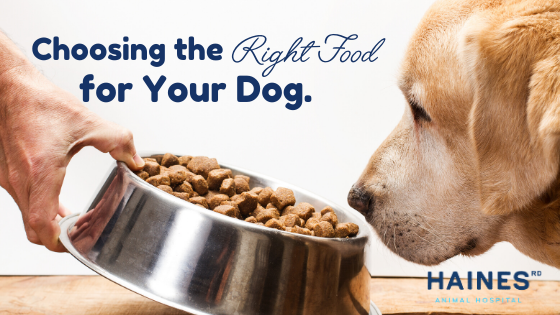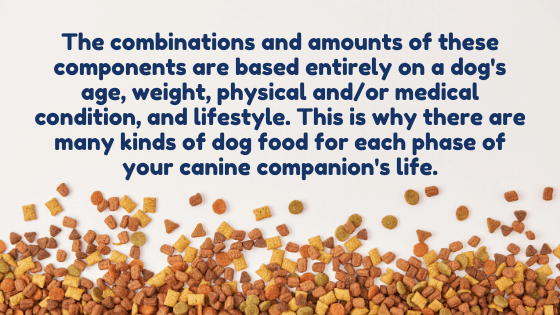Choosing the Right Food for Your Dog

Choosing the right diet for your pet is one of the most important things that you can offer them. Unfortunately it is not a simple question, even for a healthy pet. There are literally thousands of different pet foods with new ones every week. Feeding options have become complicated by a mixture of science, hype, marketing and convenience.
There is no way to know the “best” diet for a particular pet. The only way to know is to break down the health concerns, see what we know about nutritional requirements with these concerns and then feed the diet and monitor what happens. Dogs have individual needs and what the same food does in different bodies is highly variable as many people already know. Because canine nutrition ultimately plays a large part in the quality of your dog’s life, we want to share some veterinary insight with you about proper dog nutrition, whether you are looking for puppy food recommendations, or adult and senior dog nutrition advice.
The keys to canine nutrition
The following dietary components represent the fundamental keys to canine nutrition:
- Proteins: Proteins are complex molecules made up of amino acids, the building blocks of cell growth, maintenance and repair. In companion animals like dogs, one of the biggest demands for protein comes from the maintenance of fur and hair, which can use up to 30 percent of a dog’s daily protein intake
- Fats: Fats provide the most concentrated source of energy in the canine diet. They also supply the fatty acids that are important building blocks for important substances and essential to maintaining normal, healthy cells
- Carbohydrates: Carbohydrates can be broken down by the digestive system and converted to glucose which can also be a source of energy. Carbohydrates in the form of whole grains can furnish iron, minerals and fiber, as well as other beneficial nutrients
- Vitamins: Vitamins organic substances, or synthetic derivatives thereof, required for normal body functioning. They are also important in the conversion of calories to energy, the boosting of immunity and other body processes
- Minerals: Minerals are inorganic nutrients that make up less than 1% of a dog’s body weight but are essential to many important functions, such as growth, strong bones and healthy teeth

What you should consider for healthy pets:
1. There is very little standardization in the pet food industry.
For example, one company’s senior diet can have completely different nutrient amounts than another senior diet. In order to know what the company has changed in order to call it “senior”, you have to ask. A senior diet basically means nothing. Some companies have great websites that explain their diets and some do not. Forget about the ones that do not. In this day and age there is no reason to have a website with pretty pictures and no information. Know what is in the diet your feeding and why it’s in there.
2. The caloric density is highly variable between diets.
One diet might have 300 calories per cup and another 500 calories. Diets that are high in protein and lower in carbohydrates are usually higher in calories as well because they tend to be higher in fat. This is very important depending on what the weight goals are for your pet. Know how many calories your pet is eating so it can be adjusted depending on their weight. This information should be readily available on the website.
3. Dogs are genetically different from one another.
Each dog is unique and therefore there is no one dog food which works for all dogs. In general, feeding a premium brand such as Hill’s Science Diet is a safe bet for all dogs. They have many choices of proteins and types of diets (canned, dry). In fact, there are several premium brands of dog food we recommend and are good choices for most dogs.
4. Nutritional knowledge is constantly changing.
It is important that a pet food company stay current. They should have a veterinary nutritionist on staff working with them to formulate their diets and change them as knowledge and understanding change. Ideally they should perform diet trials so that they know what the food does in actual bodies. Any health claims the company makes should be substantiated by feeding trials. The diet should have AAFCO certification at a minimum. AAFCO is currently the only national standard for commercially prepared pet food. It is far from perfect but it’s all we have.
5. Pet food companies aren’t perfect and bad things happen including contamination and recalls.
Think the melamine adulteration in 2007 which involved many companies. If you want to know how frequently a company has had their food recalled you can find it with a simple Google search. This doesn’t make a company good or bad but if there is a trend of increasing recalls be wary. There are plenty of foods available with few or no recalls. Is there clear contact information on the box/ bag so you can call someone if you have a problem or question about the food?
6. There are now many non kibble options in addition to canned food and these appeal to many people.
These manufacturers should be held to the same standard as the others including having the ingredients, nutrient profiles, calories and contact info readily available. Avoid very young companies without a proven track record. This does not mean you shouldn’t use them in the future though if they consistently turn out a quality product.
7. If you have a healthy pet, stick to “normal” ingredients.
Beef, chicken, fish and save the novel protein ingredients like rabbit, duck, bison in case they need a novel diet later in life. Home cooking a diet is a viable option if you like to cook and probably good for your pet. Make sure you trust the recipe you are using. A balanced diet can be formulated from a veterinary nutritionist. Here are a couple resources: balanceit.com, petdiets.com
If your pet has health concerns, it’s best to discuss your dog’s nutritional needs with your veterinarian to better determine what type of diet would best suit them.
Attribution Link:
